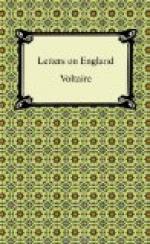among them than in our country—an advantage
that results naturally from the form of their government.
There are about eight hundred persons in England
who have a right to speak in public, and to support
the interest of the kingdom; and near five or six
thousand may in their turns aspire to the same honour.
The whole nation set themselves up as judges over
these, and every man has the liberty of publishing
his thoughts with regard to public affairs, which shows
that all the people in general are indispensably obliged
to cultivate their understandings. In England
the governments of Greece and Rome are the subject
of every conversation, so that every man is under a
necessity of perusing such authors as treat of them,
how disagreeable soever it may be to him; and this
study leads naturally to that of polite literature.
Mankind in general speak well in their respective professions.
What is the reason why our magistrates, our lawyers,
our physicians, and a great number of the clergy,
are abler scholars, have a finer taste, and more wit,
than persons of all other professions? The reason
is, because their condition of life requires a cultivated
and enlightened mind, in the same manner as a merchant
is obliged to be acquainted with his traffic.
Not long since an English nobleman, who was very
young, came to see me at Paris on his return from
Italy. He had written a poetical description
of that country, which, for delicacy and politeness,
may vie with anything we meet with in the Earl of
Rochester, or in our Chaulieu, our Sarrasin, or Chapelle.
The translation I have given of it is so inexpressive
of the strength and delicate humour of the original,
that I am obliged seriously to ask pardon of the author
and of all who understand English. However, as
this is the only method I have to make his lordship’s
verses known, I shall here present you with them in
our tongue:—
“Qu’ay je donc vu dans
l’Italie?
Orgueil, astuce, et pauvrete,
Grands complimens, peu de bonte
Et beaucoup de ceremonie.
“L’extravagante comedie
Que souvent l’Inquisition
Vent qu’on nomme religion
Mais qu’ici nous nommons folie.
“La Nature en vain bienfaisante
Vent enricher ses lieux charmans,
Des pretres la main desolante
Etouffe ses plus beaux presens.
“Les monsignors, soy disant
Grands,
Seuls dans leurs palais magnifiques
Y sont d’illustres faineants,
Sans argent, et sans domestiques.
“Pour les petits, sans liberte,
Martyrs du joug qui les domine,
Ils ont fait voeu de pauvrete,
Priant Dieu par oisivete
Et toujours jeunant par famine.
“Ces beaux lieux du Pape benis
Semblent habitez par les diables;
Et les habitans miserables
Sont damnes dans le Paradis.”
LETTER XXI.—ON THE EARL OF ROCHESTER AND MR. WALLER




